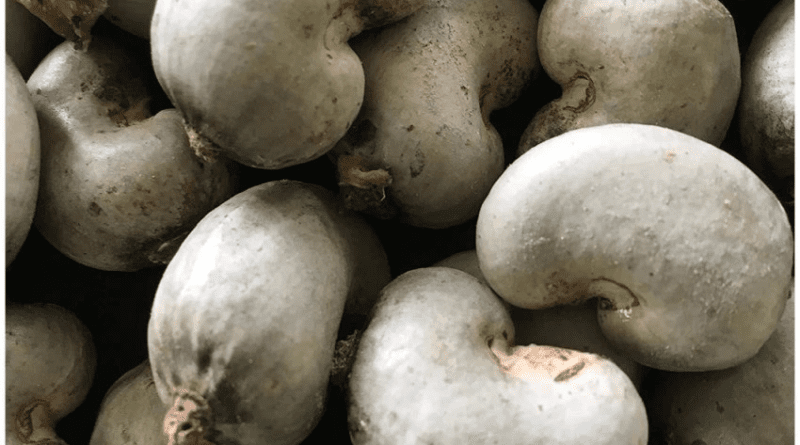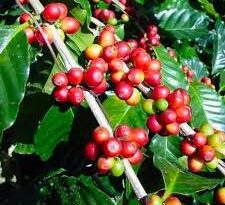The Cashew Seeds: Economic Importance, Uses, and By-Products
Cashew seeds, scientifically known as Anacardium occidentale, are the edible portion of the cashew tree’s fruit. Despite being commonly referred to as “nuts,” cashews are technically seeds that grow attached to the bottom of the cashew apple, the fruit of the cashew tree.
Cashew seeds are encased in a hard shell that contains a toxic oil called urushiol, which can cause skin irritation similar to poison ivy. Therefore, before consumption, the seeds must undergo a thorough processing method to remove this toxic substance. This typically involves roasting or steaming the seeds, followed by shelling and peeling.
Once processed, cashew seeds are prized for their rich flavor and creamy texture. They are commonly eaten as a snack on their own, often roasted and salted to enhance their taste.
Cashew seeds are also widely used in culinary applications, including as an ingredient in various dishes such as stir-fries, curries, salads, and desserts. Additionally, cashew butter and cashew milk are popular alternatives to dairy products for those with lactose intolerance or dietary preferences.
Nutritionally, cashew seeds are rich in healthy fats, protein, vitamins, and minerals. They are particularly high in monounsaturated fats, which have been linked to heart health and may help reduce the risk of cardiovascular disease. Cashew seeds also provide significant amounts of essential nutrients such as magnesium, phosphorus, copper, and manganese.
In addition to their culinary uses and nutritional benefits, cashew seeds have economic significance, as cashew trees are cultivated in tropical regions around the world for their seeds and cashew apples. The cashew seed industry supports livelihoods in many developing countries where cashew cultivation is a major source of income for farmers and exporters.
Overall, cashew seeds are versatile, nutritious, and delicious, making them a popular choice for snacking and cooking worldwide. However, individuals with allergies to tree nuts should exercise caution when consuming cashews, as they may trigger allergic reactions in some people.
The Economic Importance and Uses of Cashew Seeds

1. Export Revenue: Cashew seeds are a valuable export commodity for many countries, generating significant revenue and foreign exchange.
2. Employment Opportunities: The cashew seed industry provides employment opportunities for a large number of people, including farmers, processors, and workers in related sectors such as transportation and packaging.
3. Food Security: Cashew seeds contribute to food security by serving as a source of nutrition for local communities and households.
4. Culinary Delicacies: Cashew seeds are used in various culinary dishes, both savory and sweet, adding flavor, texture, and nutritional value. For example, they are commonly used in salads, curries, desserts, and snacks.
5. Snack Industry: Cashew seeds are a popular snack item, consumed roasted, salted, or flavored, contributing to the snack industry’s growth and profitability.
6. Nutritional Benefits: Cashew seeds are rich in nutrients such as protein, healthy fats, vitamins, and minerals, providing numerous health benefits including improved heart health, weight management, and enhanced immune function.
7. Confectionery Production: Cashew seeds are used in confectionery production, including chocolates, cookies, and candy bars, adding a crunchy texture and nutty flavor to sweet treats.
8. Culinary Innovation: Chefs and food manufacturers continually explore new ways to incorporate cashew seeds into innovative dishes and products, contributing to culinary diversity and creativity.
9. Pharmaceutical Industry: Cashew seed extracts are used in traditional medicine and pharmaceuticals for their potential health benefits, including anti-inflammatory and antioxidant properties.
10. Livestock Feed: Cashew seed by-products such as shells and meal are used as feed supplements for livestock, enriching their diets with essential nutrients and contributing to animal health and productivity.
11. Agroforestry: Cashew trees, which produce cashew seeds, contribute to agroforestry systems by providing shade, soil stabilization, and additional income for farmers.
12. Soil Improvement: Cashew seed shells and other organic matter from processing contribute to soil improvement, enhancing fertility and promoting sustainable agricultural practices.
13. Cosmetics Industry: Cashew seed oil and extracts are used in cosmetics and skincare products for their moisturizing, nourishing, and anti-aging properties.
14. Biofuel Production: Cashew seed shells can be used as biomass for biofuel production, offering a renewable energy source and reducing dependency on fossil fuels.
15. Handicrafts: Cashew seed shells are used in handicrafts and artisanal products such as jewelry, ornaments, and decorative items, supporting local craftsmanship and cultural heritage.
16. Environmental Conservation: Cashew seed cultivation promotes environmental conservation by preventing soil erosion, enhancing biodiversity, and providing habitat for wildlife.
17. Research and Development: Cashew seeds are the subject of ongoing research and development efforts to improve cultivation techniques, increase yields, and explore new applications in various industries.
Read Also: 8 Steps to Successful Perennial Pasture Establishment
The Products and By-products That Can Be Derived From Cashew Seeds

1. Cashew Seed Butter: Cashew seeds can be ground into a creamy butter, which is a popular alternative to peanut butter and a versatile ingredient in cooking and baking.
2. Roasted Cashew Seeds: Whole cashew seeds can be roasted to enhance their flavor and aroma, making them a delicious and nutritious snack option.
3. Cashew Seed Milk: Cashew seeds can be blended with water to make a dairy-free milk alternative, suitable for lactose-intolerant individuals or those following a plant-based diet.
4. Cashew Seed Flour: Ground cashew seeds can be used as a gluten-free flour alternative in baking, adding richness and moisture to baked goods.
5. Cashew Seed Oil: Cold-pressed cashew seed oil is used in cooking, salad dressings, and skincare products for its mild flavor and beneficial properties.
6. Cashew Seed Meal: After oil extraction, the remaining cashew seed meal is used as animal feed or as a protein-rich ingredient in food products.
7. Cashew Seed Shell Liquid (CSSL): CSSL is a versatile by-product of cashew seed processing, used in industries such as automotive, paint, and varnish manufacturing.
8. Cashew Seed Shell Cake: The residue left after extracting CSSL can be processed into cashew seed shell cake, used as a biofuel or organic fertilizer.
9. Cashew Seed Husk: Cashew seed husk is used as a renewable energy source for biomass boilers, providing heat and electricity for industrial and residential purposes.
10. Cashew Seed Shell Charcoal: Charcoal produced from cashew seed shells is used in cooking, metallurgy, and water purification due to its high carbon content and absorbent properties.
Read Also: 18 Medicinal Health Benefits Of Ground Elder (Aegopodium podagraria)
Frequently Asked Questions (FAQ’s) About Cashew Seeds

1. Are cashew seeds good for health?
Cashew seeds are nutritious and offer several health benefits, including improved heart health, weight management, and enhanced immune function.
2. Can cashew seeds be included in a weight loss diet?
Despite being calorie-dense, cashew seeds can be included in moderation as part of a balanced diet for weight loss, thanks to their high protein and healthy fat content, which promotes satiety.
3. Are cashew seeds safe for individuals with nut allergies?
Cashew seeds belong to the tree nut family and can trigger allergic reactions in some individuals. It’s essential to consult a healthcare professional before consuming them if you have a nut allergy.
4. How should cashew seeds be stored to maintain freshness?
Cashew seeds should be stored in an airtight container in a cool, dry place away from sunlight to prevent them from becoming rancid or losing their flavor.
5. Can cashew seeds be eaten raw?
While cashew seeds can be consumed raw, roasting them enhances their flavor and texture. Raw cashews contain a toxic compound called urushiol, which is neutralized during the roasting process.
6. Are cashew seeds a good source of protein?
Yes, cashew seeds are a good source of plant-based protein, making them an excellent snack option for vegetarians and vegans.
7. How can cashew seeds be incorporated into recipes?
Cashew seeds can be used in a variety of recipes, including salads, stir-fries, curries, baked goods, and desserts, adding flavor, texture, and nutritional value.
8. Are cashew seeds environmentally sustainable?
Cashew seed cultivation can be environmentally sustainable when practiced using responsible agricultural techniques that minimize environmental impact and promote biodiversity.
9. Can cashew seeds be used in skincare products?
Yes, cashew seed oil and extracts are used in skincare products for their moisturizing, nourishing, and anti-aging properties, benefiting skin health and appearance.
10. Are there any culinary restrictions when cooking with cashew seeds?
Cashew seeds can be included in a wide range of culinary dishes, but individuals with nut allergies should avoid consuming them, and those with dental issues may need to avoid hard or crunchy preparations.
Read Also: Practical Steps to Convert Used Cooking Oil Wastes into Biodiesel









